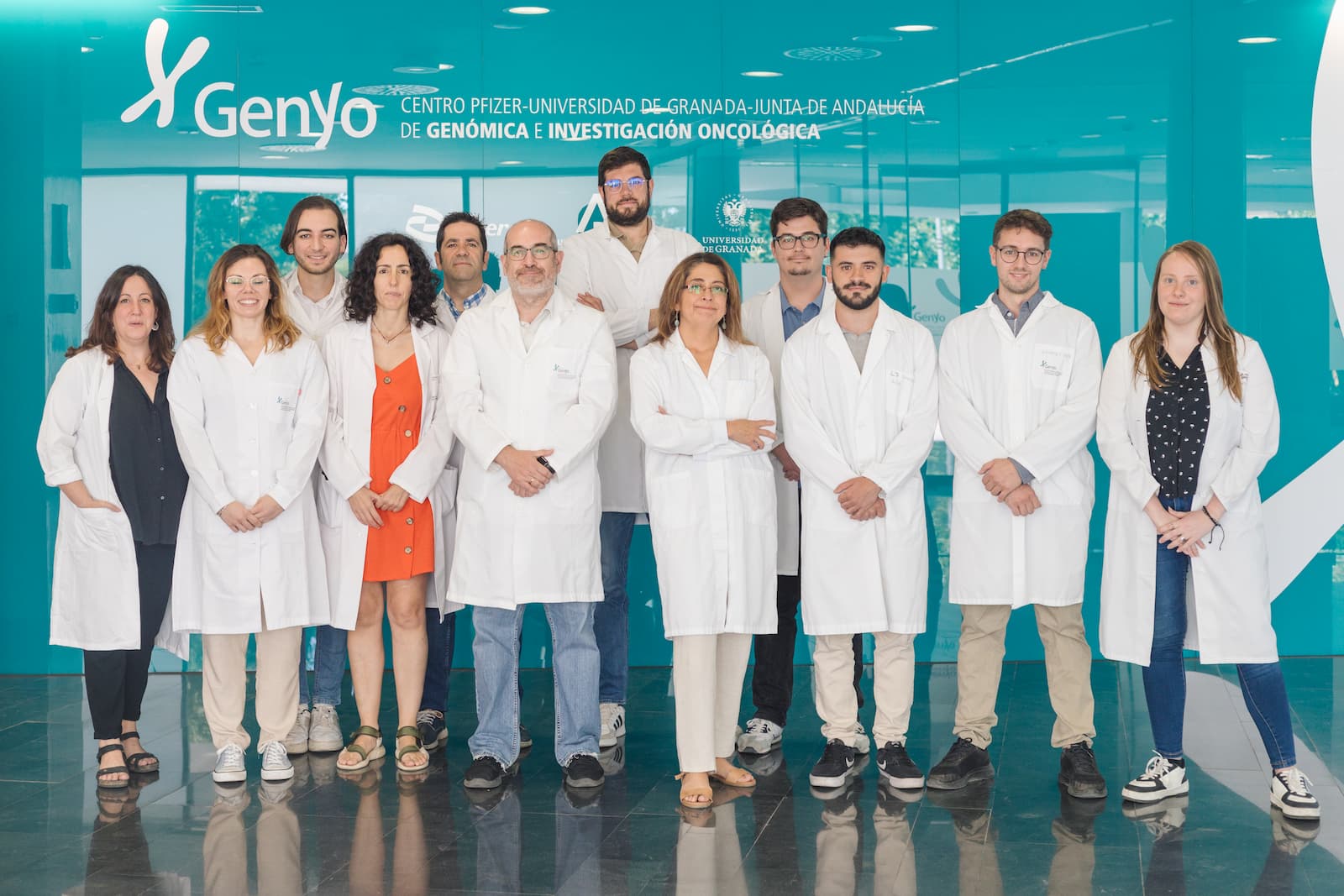No se ha encontrado investigadores para este término.
Gene Regulation, Stem Cells & Development
Nucleic acids are very flexible molecules that can adopt different conformational structures. While in living systems DNA is mostly organized in the form of a double helix and RNA is single-stranded, guanine-rich sequences exist in alternative structural forms known as G-quadruplex nucleic acids (G4). G4 are made up of four guanine bases arranged in an intracatenary square planar conformation (G tetrad) linked by Hoogsteen hydrogen bonds and further stabilized by an alkaline cation such as K+.

Inicio - Área de Medicina Personalizada - Línea Estratégica 4: Terapias Avanzadas - Gene Regulation, Stem Cells & Development
Our research leverages stem cell models to study cancer development. Normal Stem Cells and Cancer Stem Cells share biological and molecular characteristics, such as similar key signaling pathways, marker expression profiles and the ability for selfrenewal. Also, cellular reprogramming and oncogenic transformation are processes that share many similarities and are controlled by the same pluripotency genes. We are generating a human pluripotent stem cell (hPSCs)-based platform to discover new biomarkers and therapeutic targets for cancer, which also will allow us to study the mechanisms of oncogenic transformation.
BSS, an extremely rare disorder, is distinguished by a diminished count of enlarged and functionally impaired platelets. Afflicted individuals endure uncontrolled bleeding, often escalating into life-threatening scenarios. In collaboration with Dr. Martin’s research group (GENyO), along with various national and international partners, we have successfully demonstrated the effectiveness of lentiviral vectors in genetically rescuing the GP9 gene within cellular models and primary cells derived from BSS Type C patients (Martinez-Navajas G et al. 2023).
Currently, we are analyzing the phenotype of an BSS Type C animal model (Gp9-KO) generated in our laboratory. Preliminary results suggest that Gp9-KO mice manifest similar symptoms to those observed in human patients, such as macrothrombocytopenia. Concurrently, we are performing ex vivo genetic rescue of hematopoietic stem cells extracted from these mice using the same lentiviral vectors that have been shown to be effective in vitro. These results are pivotal to complete the preclinical phase of our innovative treatment, allowing for a comprehensive assessment of both functionality and biosafety in this novel genecell therapy designed for BSS Type C patients.
To date, clinical interventions for BSS patients have primarily centered on providing temporary relief from symptoms, mitigating macrothrombocytopenia, and enhancing platelet clotting. Our proposal represents the first curative therapy described to treat BSS Type C patients. Our studies open the possibility of extending this kind of therapeutic approach not only to the other two BSS subtypes (Type A 86 STRATEGIC PLAN 2024-2027 and Type B), but also to a spectrum of platelet diseases of genetic origin, known as genetic thrombopathies.
The detection of early PDAC markers in plasma holds the potential to significantly enhance therapeutic interventions for patients in the early stages of the disease. Moreover, it opens avenues for the development of novel therapies designed to impede the communication pathways between platelets and pancreatic tumor cells. This communication plays a pivotal role in the initiation of metastasis, a process accountable for the majority of PDAC-related fatalities.
Pancreatic cancer (PDAC) is one of the most aggressive solid tumors, with a 5-year survival rate of less than 8%. This low life expectancy is associated to delayed diagnosis often with metastases in distant organs. Notably, PDAC is characterized by a strong association with a state of hypercoagulability, driven by an increase in the both number and activity of platelets; a phenomenon orchestrated through communication between tumor cells and platelets. In collaboration with clinical researchers from ibs-Granada, we proposed the use of platelets and the extracellular vesicles (EVs) generated by them as rich sources of information for PDAC.
Platelets have significant advantages compared to other blood components: they are abundant, have a reduced half-life and interact with tumor cells. This interaction involves the reciprocal exchange of EVs loaded with biomolecules (proteins and nucleic acids) that exert an impact on the cells that incorporate them.
Our aim is to identify distinctive platelet or EVs biomarkers exclusive to the early stages of PDAC for utilization in an early diagnostic kit. In pursuit of this objective, we employ in vitro cellular models that faithfully replicate the genetic progression of the disease, experimental animal models, and plasma samples from individuals diagnosed with PDAC.
We are mainly focusing in Pediatric Myeloid Leukemia, a rare a heterogeneous group of diseases. About 50% of patients experience a relapse, and the overall survival ranges between 20 to 70%, depending on the leukemia subtype. There is limited progress on targeted therapies, mainly due to its low frequency, the wide variety of genetic alterations associated to it and the scarce material available for studies. We are generating stem cells models for drug screening and understanding of fundamental pathogenic mechanisms.
Our ultimate goal is to gain knowledge on the cellular and molecular similarities and differences between a normal stem cell and its malignant counterpart, to understand, identify and attack cancer stem cells.
Entidad concedente: Ministerio Ciencia, Innovación y Universidades.
Entidad concedente: Ministerio Ciencia, Innovación y Universidades.
Entidad concedente: Ministerio Ciencia, Innovación y Universidades.
Programa Operativo FEDER Andalucía 2014-2020.
Ref.: E-CTS-12-UGR20.
IP: Rosa Mª Montes Lorenzo.
Programa Operativo FEDER Andalucía 2021-2027.
Ref.: C-EXP-247-UGR23.
IP: Rosa Mª Montes Lorenzo.
Potential clinical applications of extracellular vesicles in pancreatic cancer: exploring untapped opportunities from biomarkers to novel therapeutic approaches.
Autores: Sanchez-Manas JM, Perez de Gracia N, Perales S, Martinez-Galan J, Torres C, Real PJ
05/2024 - Extracellular vesicles and circulating nucleic acids
MiRNA expression as outcome predictor in pediatric AML: systematic evaluation of a new model.
Autores: Ellson I, Martorell-Marugán J, Carmona-Sáez P, Ramos-Mejia V
08/2024 - NPJ genomic medicine
Human Embryonic Stem Cell-Derived Immature Midbrain Dopaminergic Neurons Transplanted in Parkinsonian Monkeys.
Autores: López-Ornelas A, Escobedo-Avila I, Ramírez-García G, Lara-Rodarte R, Meléndez-Ramírez C, Urrieta-Chávez B, Barrios-García T, Cáceres-Chávez VA, Flores-Ponce X, Carmona F, Reynoso CA, Aguilar C, Kerik NE, Rocha L, Verdugo-Díaz L, Treviño V, Bargas J, Ramos-Mejía V, Fernández-Ruiz J, Campos-Romo A, Velasco I
11/2023 - Cells
Lentiviral gene therapy reverts GPIX expression and phenotype in Bernard-Soulier syndrome type C.
Autores: Martinez-Navajas G, Ceron-Hernandez J, Simon I, Lupiañez P, Diaz-McLynn S, Perales S, Modlich U, Guerrero JA, Martin F, Sevivas T, Lozano ML, Rivera J, Ramos-Mejia V, Tersteeg C, Real PJ
06/2023 - Molecular therapy. Nucleic acids
The pediatric leukemia oncoprotein NUP98-KDM5A induces genomic instability that may facilitate malignant transformation.
Autores: Domingo-Reinés J, Montes R, Garcia-Moreno A, Gallardo A, Sanchez-Manas JM, Ellson I, Lamolda M, Calabro C, López-Escamez JA, Catalina P, Carmona-Sáez P, Real PJ, Landeira D, Ramos-Mejia V
06/2023 - Cell death & disease
Abrogation of stemness in osteosarcoma by the mithramycin analog EC-8042 is mediated by its ability to inhibit NOTCH-1 signaling.
Autores: Estupiñán Ó, Rey V, Tornín J, Murillo D, Gallego B, Huergo C, Blanco-Lorenzo V, Victoria González M, Rodríguez A, Moris F, González J, Ayllón V, Ramos-Mejía V, Bigas A, Rodríguez R
06/2023 - Biomedicine & pharmacotherapy = Biomedecine & pharmacotherapie
Generation of a H9 Clonal Cell Line With Inducible Expression of NUP98-KDM5A Fusion Gene in the AAVS1 Safe Harbor Locus.
Autores: Domingo-Reinés J, Martínez-Navajas G, Montes R, Lamolda M, Simón I, Castaño J, Ríos-Pelegrina R, Lopez-Hidalgo JL, García Del Moral R, Marchal JA, Real PJ, Ramos-Mejía V
06/2022 - Frontiers in cell and developmental biology
Characterization of Genetic Variants of Uncertain Significance for the ALPL Gene in Patients With Adult Hypophosphatasia.
Autores: Sanabria-de la Torre R, Martínez-Heredia L, González-Salvatierra S, Andújar-Vera F, Iglesias-Baena I, Villa-Suárez JM, Contreras-Bolívar V, Corbacho-Soto M, Martínez-Navajas G, Real PJ, García-Fontana C, Muñoz-Torres M, García-Fontana B
04/2022 - Frontiers in endocrinology
A NK Cell Odyssey: From Bench to Therapeutics Against Hematological Malignancies.
Autores: Ramos-Mejia V, Arellano-Galindo J, Mejía-Arangure JM, Cruz-Munoz ME
04/2022 - Frontiers in immunology
Exchange of cellular components between platelets and tumor cells: impact on tumor cells behavior.
Autores: Rodriguez-Martinez A, Simon-Saez I, Perales S, Garrido-Navas C, Russo A, de Miguel-Perez D, Puche-Sanz I, Alaminos C, Ceron J, Lorente JA, Molina MP, Gonzalez C, Cristofanilli M, Ortigosa-Palomo A, Real PJ, Rolfo C, Serrano MJ
02/2022 - Theranostics
Proximity labeling identifies a repertoire of site-specific R-loop modulators.
Autores: Yan Q, Wulfridge P, Doherty J, Fernandez-Luna JL, Real PJ, Tang HY, Sarma K
01/2022 - Nature communications
Engraftment characterization of risk-stratified AML in NSGS mice.
Autores: Díaz de la Guardia R, Velasco-Hernandez T, Gutiérrez-Agüera F, Roca-Ho H, Molina O, Nombela-Arrieta C, Bataller A, Fuster JL, Anguita E, Vives S, Zamora L, Nomdedeu J, Gómez-Casares MT, Ramírez-Orellana M, Lapillonne H, Ramos-Mejia V, Rodríguez-Manzaneque JC, Bueno C, Lopez-Millan B, Menéndez P
12/2021 - Blood advances
Improved Functionality of Integration-Deficient Lentiviral Vectors (IDLVs) by the Inclusion of IS(2) Protein Docks.
Autores: Cortijo-Gutiérrez M, Sánchez-Hernández S, Tristán-Manzano M, Maldonado-Pérez N, Lopez-Onieva L, Real PJ, Herrera C, Marchal JA, Martin F, Benabdellah K
08/2021 - Pharmaceutics
Cross-Resistance to Abiraterone and Enzalutamide in Castration Resistance Prostate Cancer Cellular Models Is Mediated by AR Transcriptional Reactivation.
Autores: Simon I, Perales S, Casado-Medina L, Rodríguez-Martínez A, Garrido-Navas MDC, Puche-Sanz I, Diaz-Mochon JJ, Alaminos C, Lupiañez P, Lorente JA, Serrano MJ, Real PJ
03/2021 - Cancers
The molecular clock protein Bmal1 regulates cell differentiation in mouse embryonic stem cells.
Autores: Gallardo A, Molina A, Asenjo HG, Martorell-Marugán J, Montes R, Ramos-Mejia V, Sanchez-Pozo A, Carmona-Sáez P, Lopez-Onieva L, Landeira D
04/2020 - Life science alliance
GARP is a key molecule for mesenchymal stromal cell responses to TGF-β and fundamental to control mitochondrial ROS levels.
Autores: Carrillo-Gálvez AB, Gálvez-Peisl S, González-Correa JE, de Haro-Carrillo M, Ayllón V, Carmona-Sáez P, Ramos-Mejía V, Galindo-Moreno P, Cara FE, Granados-Principal S, Muñoz P, Martin F, Anderson P
05/2020 - Stem cells translational medicine
GENYOi005-A: An induced pluripotent stem cells (iPSCs) line generated from a patient with Familial Platelet Disorder with associated Myeloid Malignancy (FPDMM) carrying a p.Thr196Ala variant.
Autores: Lamolda M, Montes R, Simón I, Perales S, Martínez-Navajas G, Lopez-Onieva L, Ríos-Pelegrina R, Del Moral RG, Griñan-Lison C, Marchal JA, Lozano ML, Ramos-Mejia V, Rivera J, Bastida JM, Real PJ
12/2019 - Stem cell research
Epidemiological, Clinical and Genetic Study of Hypophosphatasia in A Spanish Population: Identification of Two Novel Mutations in The Alpl Gene.
Autores: García-Fontana C, Villa-Suárez JM, Andújar-Vera F, González-Salvatierra S, Martínez-Navajas G, Real PJ, Gómez Vida JM, de Haro T, García-Fontana B, Muñoz-Torres M
07/2019 - Scientific reports
GENYOi004-A: An induced pluripotent stem cells (iPSCs) line generated from a patient with autism-related ADNP syndrome carrying a pTyr719* mutation.
Autores: Montes R, Mollinedo P, Perales S, Gonzalez-Lamuño D, Ramos-Mejía V, Fernandez-Luna JL, Real PJ
05/2019 - Stem cell research
Enhanced hemato-endothelial specification during human embryonic differentiation through developmental cooperation between AF4-MLL and MLL-AF4 fusions.
Autores: Bueno C, Calero-Nieto FJ, Wang X, Valdés-Mas R, Gutiérrez-Agüera F, Roca-Ho H, Ayllon V, Real PJ, Arambilet D, Espinosa L, Torres-Ruiz R, Agraz-Doblas A, Varela I, de Boer J, Bigas A, Gottgens B, Marschalek R, Menendez P
06/2019 - Haematologica
The IS2 Element Improves Transcription Efficiency of Integration-Deficient Lentiviral Vector Episomes.
Autores: Sánchez-Hernández S, Gutierrez-Guerrero A, Martín-Guerra R, Cortijo-Gutierrez M, Tristán-Manzano M, Rodriguez-Perales S, Sanchez L, Garcia-Perez JL, Chato-Astrain J, Fernandez-Valades R, Carrillo-Galvez AB, Anderson P, Montes R, Real PJ, Martin F, Benabdellah K
12/2018 - Molecular therapy. Nucleic acids
Producing Stem Cell-Based Transplants for Future Therapeutic Purposes.
Autores: Velasco I, Kunath T, Ramos-Mejía V, Velasco-Velázquez MA
01/2017 - Stem cells international
Hoxa9 and EGFP reporter expression in human Embryonic Stem Cells (hESC) as useful tools for studying human development.
Autores: Domingo-Reines J, López-Ornelas A, Montes R, Romero T, Rodriguez-Llamas JL, Lara-Rodarte R, González-Pozas F, Ayllon V, Menendez P, Velasco I, Ramos-Mejia V
12/2017 - Stem cell research
Establishment of 2 control and 2 hPSC cell lines constitutively expressing the Notch ligand DLL4.
Autores: González-Pozas F, Montes R, Domingo-Reinés J, Ayllón V, Ramos-Mejía V
12/2017 - Stem cell research
RUNX1c Regulates Hematopoietic Differentiation of Human Pluripotent Stem Cells Possibly in Cooperation with Proinflammatory Signaling.
Autores: Navarro-Montero O, Ayllon V, Lamolda M, López-Onieva L, Montes R, Bueno C, Ng E, Guerrero-Carreno X, Romero T, Romero-Moya D, Stanley E, Elefanty A, Ramos-Mejia V, Menendez P, Real PJ
11/2017 - Stem cells (Dayton, Ohio)
New hPSC-based human models to study pediatric Acute Megakaryoblastic Leukemia harboring the fusion oncogene RBM15-MKL1.
Autores: Ayllón V, Vogel-González M, González-Pozas F, Domingo-Reinés J, Montes R, Morales-Cacho L, Ramos-Mejía V
03/2017 - Stem cell research
Induced pluripotent stem cells derived from Bernard-Soulier Syndrome patient's peripheral blood cells with a p.Phe55Ser mutation in the GPIX gene.
Autores: Lopez-Onieva L, Lamolda M, Montes R, Lozano ML, Vicente V, Rivera J, Ramos-Mejía V, Real PJ
04/2017 - Stem cell research
Poly(ethylmethacrylate-co-diethylaminoethyl acrylate) coating improves endothelial re-population, bio-mechanical and anti-thrombogenic properties of decellularized carotid arteries for blood vessel replacement.
Autores: López-Ruiz E, Venkateswaran S, Perán M, Jiménez G, Pernagallo S, Díaz-Mochón JJ, Tura-Ceide O, Arrebola F, Melchor J, Soto J, Rus G, Real PJ, Diaz-Ricart M, Conde-González A, Bradley M, Marchal JA
03/2017 - Scientific reports
Generation of a human induced pluripotent stem cell (iPSC) line from a Bernard-Soulier syndrome patient with the mutation p.Asn45Ser in the GPIX gene.
Autores: Lopez-Onieva L, Machuca C, Lamolda M, Montes R, Lozano ML, Vicente V, Rivera J, Ramos-Mejía V, Real PJ
11/2016 - Stem cell research
Corrigendum to "Generation of induced pluripotent stem cells (iPSCs) from a Bernard-Soulier syndrome patient carrying a W71R mutation in the GPIX gene" [Stem Cell Res. 16/3 (2016) 692-695].
Autores: Lopez-Onieva L, Montes R, Lamolda M, Romero T, Ayllon V, Lozano ML, Vicente V, Rivera J, Ramos-Mejía V, Real PJ
09/2016 - Stem cell research
Development Refractoriness of MLL-Rearranged Human B Cell Acute Leukemias to Reprogramming into Pluripotency.
Autores: Muñoz-López A, Romero-Moya D, Prieto C, Ramos-Mejía V, Agraz-Doblas A, Varela I, Buschbeck M, Palau A, Carvajal-Vergara X, Giorgetti A, Ford A, Lako M, Granada I, Ruiz-Xivillé N, Rodríguez-Perales S, Torres-Ruíz R, Stam RW, Fuster JL, Fraga MF, Nakanishi M, Cazzaniga G, Bardini M, Cobo I, Bayon GF, Fernandez AF, Bueno C, Menendez P
10/2016 - Stem cell reports
Generation of human pluripotent stem cell lines with suppressed expression of the Notch ligand DLL4 using short hairpin RNAs.
Autores: González-Pozas F, Montes R, López-Onieva L, Romero T, Domingo-Reinés J, Real PJ, Ramos-Mejía V, Ayllón V
05/2016 - Stem cell research
Generation of induced pluripotent stem cells (iPSCs) from a Bernard-Soulier syndrome patient carrying a W71R mutation in the GPIX gene.
Autores: Lopez-Onieva L, Montes R, Lamolda M, Romero T, Ayllon V, Lozano ML, Vicente V, Rivera J, Ramos-Mejía V, Real PJ
05/2016 - Stem cell research
Semaphorin 3C Released from a Biocompatible Hydrogel Guides and Promotes Axonal Growth of Rodent and Human Dopaminergic Neurons.
Autores: Carballo-Molina OA, Sánchez-Navarro A, López-Ornelas A, Lara-Rodarte R, Salazar P, Campos-Romo A, Ramos-Mejía V, Velasco I
06/2016 - Tissue engineering. Part A
Generation and characterization of the human iPSC line PBMC1-iPS4F1 from adult peripheral blood mononuclear cells.
Autores: Montes R, Romero T, Cabrera S, Ayllon V, Lopez-Escamez JA, Ramos-Mejia V, Real PJ
11/2015 - Stem cell research
Absence of WASp Enhances Hematopoietic and Megakaryocytic Differentiation in a Human Embryonic Stem Cell Model.
Autores: Toscano MG, Muñoz P, Sánchez-Gilabert A, Cobo M, Benabdellah K, Anderson P, Ramos-Mejía V, Real PJ, Neth O, Molinos-Quintana A, Gregory PD, Holmes MC, Martin F
02/2016 - Molecular therapy : the journal of the American Society of Gene Therapy
Generation of human iPSC line GRX-MCiPS4F-A2 from adult peripheral blood mononuclear cells (PBMCs) with Spanish genetic background.
Autores: Cabrera S, Ji AR, Frejo L, Ramos-Mejia V, Romero T, Real P, Lopez-Escamez JA
09/2015 - Stem cell research
The Notch ligand DLL4 specifically marks human hematoendothelial progenitors and regulates their hematopoietic fate.
Autores: Ayllón V, Bueno C, Ramos-Mejía V, Navarro-Montero O, Prieto C, Real PJ, Romero T, García-León MJ, Toribio ML, Bigas A, Menendez P
08/2015 - Leukemia
SCL/TAL1-mediated transcriptional network enhances megakaryocytic specification of human embryonic stem cells.
Autores: Toscano MG, Navarro-Montero O, Ayllon V, Ramos-Mejia V, Guerrero-Carreno X, Bueno C, Romero T, Lamolda M, Cobo M, Martin F, Menendez P, Real PJ
01/2015 - Molecular therapy : the journal of the American Society of Gene Therapy
HOXA9 promotes hematopoietic commitment of human embryonic stem cells.
Autores: Ramos-Mejía V, Navarro-Montero O, Ayllón V, Bueno C, Romero T, Real PJ, Menendez P
11/2014 - Blood
Concise review: Generation of neurons from somatic cells of healthy individuals and neurological patients through induced pluripotency or direct conversion.
Autores: Velasco I, Salazar P, Giorgetti A, Ramos-Mejía V, Castaño J, Romero-Moya D, Menendez P
11/2014 - Stem cells (Dayton, Ohio)
Ligand-independent FLT3 activation does not cooperate with MLL-AF4 to immortalize/transform cord blood CD34+ cells.
Autores: Montes R, Ayllón V, Prieto C, Bursen A, Prelle C, Romero-Moya D, Real PJ, Navarro-Montero O, Chillón C, Marschalek R, Bueno C, Menendez P
03/2014 - Leukemia
The role of RUNX1 isoforms in hematopoietic commitment of human pluripotent stem cells.
Autores: Real PJ, Navarro-Montero O, Ramos-Mejía V, Ayllón V, Bueno C, Menéndez P
06/2013 - Blood
FLT3 activation cooperates with MLL-AF4 fusion protein to abrogate the hematopoietic specification of human ESCs.
Autores: Bueno C, Ayllón V, Montes R, Navarro-Montero O, Ramos-Mejia V, Real PJ, Romero-Moya D, Araúzo-Bravo MJ, Menendez P
05/2013 - Blood
Gli3-mediated hedgehog inhibition in human pluripotent stem cells initiates and augments developmental programming of adult hematopoiesis.
Autores: McIntyre BA, Ramos-Mejia V, Rampalli S, Mechael R, Lee JH, Alev C, Sheng G, Bhatia M
02/2013 - Blood
Intrahepatic transplantation of cord blood CD34+ cells into newborn NOD/SCID-IL2Rγ(null) mice allows efficient multi-organ and multi-lineage hematopoietic engraftment without accessory cells.
Autores: Navarro-Montero O, Romero-Moya D, Montes R, Ramos-Mejía V, Bueno C, Real PJ, Menendez P
11/2012 - Clinical immunology (Orlando, Fla.)
Specific marking of hESCs-derived hematopoietic lineage by WAS-promoter driven lentiviral vectors.
Autores: Muñoz P, Toscano MG, Real PJ, Benabdellah K, Cobo M, Bueno C, Ramos-Mejía V, Menendez P, Anderson P, Martín F
01/2012 - PloS one
Residual expression of the reprogramming factors prevents differentiation of iPSC generated from human fibroblasts and cord blood CD34+ progenitors.
Autores: Ramos-Mejía V, Montes R, Bueno C, Ayllón V, Real PJ, Rodríguez R, Menendez P
01/2012 - PloS one
iPSCs from cancer cells: challenges and opportunities.
Autores: Ramos-Mejia V, Fraga MF, Menendez P
05/2012 - Trends in molecular medicine
SCL/TAL1 regulates hematopoietic specification from human embryonic stem cells.
Autores: Real PJ, Ligero G, Ayllon V, Ramos-Mejia V, Bueno C, Gutierrez-Aranda I, Navarro-Montero O, Lako M, Menendez P
07/2012 - Molecular therapy : the journal of the American Society of Gene Therapy
A human ESC model for MLL-AF4 leukemic fusion gene reveals an impaired early hematopoietic-endothelial specification.
Autores: Bueno C, Montes R, Melen GJ, Ramos-Mejia V, Real PJ, Ayllón V, Sanchez L, Ligero G, Gutierrez-Aranda I, Fernández AF, Fraga MF, Moreno-Gimeno I, Burks D, Plaza-Calonge Mdel C, Rodríguez-Manzaneque JC, Menendez P
06/2012 - Cell research
Maintenance of human embryonic stem cells in media conditioned by human mesenchymal stem cells obviates the requirement of exogenous basic fibroblast growth factor supplementation.
Autores: Sánchez L, Gutierrez-Aranda I, Ligero G, Martín M, Ayllón V, Real PJ, Ramos-Mejía V, Bueno C, Menendez P
05/2012 - Tissue engineering. Part C, Methods
Large-scale transcriptional profiling and functional assays reveal important roles for Rho-GTPase signalling and SCL during haematopoietic differentiation of human embryonic stem cells.
Autores: Yung S, Ledran M, Moreno-Gimeno I, Conesa A, Montaner D, Dopazo J, Dimmick I, Slater NJ, Marenah L, Real PJ, Paraskevopoulou I, Bisbal V, Burks D, Santibanez-Koref M, Moreno R, Mountford J, Menendez P, Armstrong L, Lako M
12/2011 - Human molecular genetics
Maintenance of human embryonic stem cells in mesenchymal stem cell-conditioned media augments hematopoietic specification.
Autores: Ramos-Mejía V, Fernández AF, Ayllón V, Real PJ, Bueno C, Anderson P, Martín F, Fraga MF, Menendez P
06/2012 - Stem cells and development
A promoter DNA demethylation landscape of human hematopoietic differentiation.
Autores: Calvanese V, Fernández AF, Urdinguio RG, Suárez-Alvarez B, Mangas C, Pérez-García V, Bueno C, Montes R, Ramos-Mejía V, Martínez-Camblor P, Ferrero C, Assenov Y, Bock C, Menendez P, Carrera AC, Lopez-Larrea C, Fraga MF
01/2012 - Nucleic acids research
Enrichment of human ESC-derived multipotent mesenchymal stem cells with immunosuppressive and anti-inflammatory properties capable to protect against experimental inflammatory bowel disease.
Autores: Sánchez L, Gutierrez-Aranda I, Ligero G, Rubio R, Muñoz-López M, García-Pérez JL, Ramos V, Real PJ, Bueno C, Rodríguez R, Delgado M, Menendez P
02/2011 - Stem cells (Dayton, Ohio)
The adaptation of human embryonic stem cells to different feeder-free culture conditions is accompanied by a mitochondrial response.
Autores: Ramos-Mejia V, Bueno C, Roldan M, Sanchez L, Ligero G, Menendez P, Martin M
05/2012 - Stem cells and development
The TLX1 oncogene drives aneuploidy in T cell transformation.
Autores: De Keersmaecker K, Real PJ, Gatta GD, Palomero T, Sulis ML, Tosello V, Van Vlierberghe P, Barnes K, Castillo M, Sole X, Hadler M, Lenz J, Aplan PD, Kelliher M, Kee BL, Pandolfi PP, Kappes D, Gounari F, Petrie H, Van der Meulen J, Speleman F, Paietta E, Racevskis J, Wiernik PH, Rowe JM, Soulier J, Avran D, Cavé H, Dastugue N, Raimondi S, Meijerink JP, Cordon-Cardo C, Califano A, Ferrando AA
11/2010 - Nature medicine
iPSC lines that do not silence the expression of the ectopic reprogramming factors may display enhanced propensity to genomic instability.
Autores: Ramos-Mejia V, Muñoz-Lopez M, Garcia-Perez JL, Menendez P
10/2010 - Cell research
Nodal/Activin signaling predicts human pluripotent stem cell lines prone to differentiate toward the hematopoietic lineage.
Autores: Ramos-Mejia V, Melen GJ, Sanchez L, Gutierrez-Aranda I, Ligero G, Cortes JL, Real PJ, Bueno C, Menendez P
12/2010 - Molecular therapy : the journal of the American Society of Gene Therapy
Human induced pluripotent stem cells develop teratoma more efficiently and faster than human embryonic stem cells regardless the site of injection.
Autores: Gutierrez-Aranda I, Ramos-Mejia V, Bueno C, Munoz-Lopez M, Real PJ, Mácia A, Sanchez L, Ligero G, Garcia-Parez JL, Menendez P
09/2010 - Stem cells (Dayton, Ohio)
Multiparameter comparisons of embryoid body differentiation toward human stem cell applications.
Autores: Hong SH, Werbowetski-Ogilvie T, Ramos-Mejia V, Lee JB, Bhatia M
09/2010 - Stem cell research
Mesenchymal stem cells facilitate the derivation of human embryonic stem cells from cryopreserved poor-quality embryos.
Autores: Cortes JL, Sanchez L, Ligero G, Gutierrez-Aranda I, Catalina P, Elosua C, Leone PE, Montes R, Bueno C, Ramos-Mejía V, Maleno I, García-Pérez JL, Menendez P
08/2009 - Human reproduction (Oxford, England)
NOTCH inhibition and glucocorticoid therapy in T-cell acute lymphoblastic leukemia.
Autores: Real PJ, Ferrando AA
08/2009 - Leukemia
Noncanonical Wnt signaling orchestrates early developmental events toward hematopoietic cell fate from human embryonic stem cells.
Autores: Vijayaragavan K, Szabo E, Bossé M, Ramos-Mejia V, Moon RT, Bhatia M
03/2009 - Cell stem cell
Characterization of human embryonic stem cells with features of neoplastic progression.
Autores: Werbowetski-Ogilvie TE, Bossé M, Stewart M, Schnerch A, Ramos-Mejia V, Rouleau A, Wynder T, Smith MJ, Dingwall S, Carter T, Williams C, Harris C, Dolling J, Wynder C, Boreham D, Bhatia M
01/2009 - Nature biotechnology
Gamma-secretase inhibitors reverse glucocorticoid resistance in T cell acute lymphoblastic leukemia.
Autores: Real PJ, Tosello V, Palomero T, Castillo M, Hernando E, de Stanchina E, Sulis ML, Barnes K, Sawai C, Homminga I, Meijerink J, Aifantis I, Basso G, Cordon-Cardo C, Ai W, Ferrando A
01/2009 - Nature medicine
NOTCH1 extracellular juxtamembrane expansion mutations in T-ALL.
Autores: Sulis ML, Williams O, Palomero T, Tosello V, Pallikuppam S, Real PJ, Barnes K, Zuurbier L, Meijerink JP, Ferrando AA
08/2008 - Blood
Mutational loss of PTEN induces resistance to NOTCH1 inhibition in T-cell leukemia.
Autores: Palomero T, Sulis ML, Cortina M, Real PJ, Barnes K, Ciofani M, Caparros E, Buteau J, Brown K, Perkins SL, Bhagat G, Agarwal AM, Basso G, Castillo M, Nagase S, Cordon-Cardo C, Parsons R, Zúñiga-Pflücker JC, Dominguez M, Ferrando AA
10/2007 - Nature medicine
IGF and FGF cooperatively establish the regulatory stem cell niche of pluripotent human cells in vitro.
Autores: Bendall SC, Stewart MH, Menendez P, George D, Vijayaragavan K, Werbowetski-Ogilvie T, Ramos-Mejia V, Rouleau A, Yang J, Bossé M, Lajoie G, Bhatia M
08/2007 - Nature
NOTCH1 directly regulates c-MYC and activates a feed-forward-loop transcriptional network promoting leukemic cell growth.
Autores: Palomero T, Lim WK, Odom DT, Sulis ML, Real PJ, Margolin A, Barnes KC, O'Neil J, Neuberg D, Weng AP, Aster JC, Sigaux F, Soulier J, Look AT, Young RA, Califano A, Ferrando AA
11/2006 - Proceedings of the National Academy of Sciences of the United States of America
Cannabinoid receptors as novel targets for the treatment of melanoma.
Autores: Blázquez C, Carracedo A, Barrado L, Real PJ, Fernández-Luna JL, Velasco G, Malumbres M, Guzmán M
12/2006 - FASEB journal : official publication of the Federation of American Societies for Experimental Biology
A novel role for proline- and acid-rich basic region leucine zipper (PAR bZIP) proteins in the transcriptional regulation of a BH3-only proapoptotic gene.
Autores: Benito A, Gutierrez O, Pipaon C, Real PJ, Gachon F, Ritchie AE, Fernandez-Luna JL
12/2006 - The Journal of biological chemistry
Transcriptional activation of the proapoptotic bik gene by E2F proteins in cancer cells.
Autores: Real PJ, Sanz C, Gutierrez O, Pipaon C, Zubiaga AM, Fernandez-Luna JL
10/2006 - FEBS letters
CUTLL1, a novel human T-cell lymphoma cell line with t(7;9) rearrangement, aberrant NOTCH1 activation and high sensitivity to gamma-secretase inhibitors.
Autores: Palomero T, Barnes KC, Real PJ, Glade Bender JL, Sulis ML, Murty VV, Colovai AI, Balbin M, Ferrando AA
07/2006 - Leukemia
Identification of c-Kit gene mutations in patients with polycythemia vera.
Autores: Fontalba A, Real PJ, Fernandez-Luna JL, Agirre X, Prosper F, Richard C
10/2006 - Leukemia research
Blockade of epidermal growth factor receptors chemosensitizes breast cancer cells through up-regulation of Bnip3L.
Autores: Real PJ, Benito A, Cuevas J, Berciano MT, de Juan A, Coffer P, Gomez-Roman J, Lafarga M, Lopez-Vega JM, Fernandez-Luna JL
09/2005 - Cancer research
Defective binding of transcriptional repressor ZEB via DNA methylation contributes to increased constitutive levels of p73 in Fanconi anemia cells.
Autores: Pipaon C, Real PJ, Fernandez-Luna JL
08/2005 - FEBS letters
Phenotypic analyses of mouse embryos with ubiquitous expression of Oct4: effects on mid-hindbrain patterning and gene expression.
Autores: Ramos-Mejía V, Escalante-Alcalde D, Kunath T, Ramírez L, Gertsenstein M, Nagy A, Lomelí H
01/2005 - Developmental dynamics : an official publication of the American Association of Anatomists
Breast cancer cells can evade apoptosis-mediated selective killing by a novel small molecule inhibitor of Bcl-2.
Autores: Real PJ, Cao Y, Wang R, Nikolovska-Coleska Z, Sanz-Ortiz J, Wang S, Fernandez-Luna JL
11/2004 - Cancer research
Resistance to chemotherapy via Stat3-dependent overexpression of Bcl-2 in metastatic breast cancer cells.
Autores: Real PJ, Sierra A, De Juan A, Segovia JC, Lopez-Vega JM, Fernandez-Luna JL
10/2002 - Oncogene
Targeted insertion of Cre recombinase into the TNAP gene: excision in primordial germ cells.
Autores: Lomelí H, Ramos-Mejía V, Gertsenstein M, Lobe CG, Nagy A
02/2000 - Genesis (New York, N.Y. : 2000)
Información general
Miembros
Proyectos
Publicaciones
Información general
Miembros
Proyectos
Publicaciones
Contenidos
Otros Grupos de Investigación

Esta web utiliza cookies
Utilizamos cookies necesarias y opcionales para brindarle la mejor experiencia posible. Haz clic en aceptar para continuar o conocer más en nuestra política de cookies.
Ver política de cookies.Ya has seleccionado tus preferencias sobre cookies en sesiones anteriores. ¿Quieres modificarlas?
Cookies obligatorias
Son aquéllas que permiten al usuario la navegación a través de la página web, y la utilización de las diferentes opciones o servicios que en ella existan como, por ejemplo, identificar la sesión, acceder a partes de acceso restringido, realizar el proceso de compra de un pedido o utilizar elementos de seguridad durante la navegación.
Ver las cookies que utilizamos.Cookies de personalización, análisis o funcionales
Son aquéllas que permiten al usuario acceder al servicio con algunas características de carácter general predefinidas en función de una serie de criterios en el terminal del usuario como por ejemplo serian el idioma, el tipo de navegador a través del cual accede al servicio, la configuración regional desde donde accede al servicio, cuantificar el número de usuarios y así realizar la medición y análisis estadístico de la utilización que hacen los usuarios del servicio ofertado. Para ello se analiza su navegación en nuestra página web con el fin de mejorar la oferta de productos o servicios que le ofrecemos.
Ver las cookies que utilizamos.Las acepto:
Cookies publicitarias o informativas
Son aquéllas que nos permiten la gestión de la forma más eficaz posible de nuestra información, adecuando su contenido a las preferencias del usuario, al tipo de terminal desde el que accede al servicio, a las características del uso que realiza el usuario de los servicios, ofrecerle publicidad propia o de terceros, etc. Para ello analizamos sus hábitos de navegación en Internet para ofrecerle publicidad relacionada con los intereses de sus perfiles de navegación.
Ver las cookies que utilizamos.Las acepto:
Cookies analíticas
Son aquéllas que nos permiten recoger información del uso que se realiza del sitio web.
Ver las cookies que utilizamos.Las acepto:







